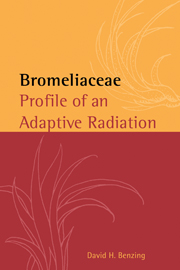Book contents
- Frontmatter
- Contents
- List of contributors
- Preface
- Acknowledgments
- Glossary
- Abbreviations
- Part one Brief overview
- Part two Basic structure, function, ecology and evolution
- 2 Vegetative structure
- 3 Reproductive structure
- 4 Carbon and water balance
- 5 Mineral nutrition
- 6 Reproduction and life history
- 7 Ecology
- 8 Relationships with fauna
- 9 History and evolution
- Part three Special topics
- Literature cited
- Name index
- Subject index
- Taxon index
4 - Carbon and water balance
from Part two - Basic structure, function, ecology and evolution
Published online by Cambridge University Press: 19 January 2010
- Frontmatter
- Contents
- List of contributors
- Preface
- Acknowledgments
- Glossary
- Abbreviations
- Part one Brief overview
- Part two Basic structure, function, ecology and evolution
- 2 Vegetative structure
- 3 Reproductive structure
- 4 Carbon and water balance
- 5 Mineral nutrition
- 6 Reproduction and life history
- 7 Ecology
- 8 Relationships with fauna
- 9 History and evolution
- Part three Special topics
- Literature cited
- Name index
- Subject index
- Taxon index
Summary
Temperate zone flora dominate the early literature on plant ecophysiology, but Bromeliaceae account for a disproportionate number of the tropical species studied during this period. Billings (1904) recorded moisture exchange during his inquiry on the biology of Spanish moss. Mez (1904) and several European contemporaries demonstrated how the foliar trichome of this same epiphyte and comparable Tillandsioideae eliminates need for absorptive roots. Harris (1918) contrasted osmotic pressures in the leaves of trees and associated bromeliads and co-occurring vascular epiphytes in Florida and Jamaica.
Wherry and Capen (1928) surveyed Tillandsia usneoides growing along Florida highways for its capacity to accumulate nutrients and certain technological metals. Research on pineapple metabolism began in earnest during the late 1930s. Finally, Leopoldo M. Coutinho included numerous Bromelioideae and Tillandsioideae in his pioneering investigations on the pathways responsible for CO2 assimilation by diverse Brazilian flora (e.g., Coutinho 1963). Since then, a growing number of scientists have been measuring gas exchange, chlorophyll fluorescence and other indicators of plant performance and physiological state to expand the database on Bromeliaceae.
Current records of carbon fixation pathways, many accompanied by data on water balance and light relations, document the ecostrategies of more bromeliads than of members of any other family (Martin 1994; Table 4.1). Moreover, concerns about issues ranging from global change to drought-tolerance assure continuing interest in the ecology and evolution of Bromeliaceae. Ananas comosus, Aechmea magdalenae, Bromelia humilis, Tillandsia usneoides and Guzmania monostachia constitute the best-known species; less complete profiles of many more taxa further attest to the exceptional variety of growing conditions these plants experience in situ.
- Type
- Chapter
- Information
- BromeliaceaeProfile of an Adaptive Radiation, pp. 107 - 186Publisher: Cambridge University PressPrint publication year: 2000



